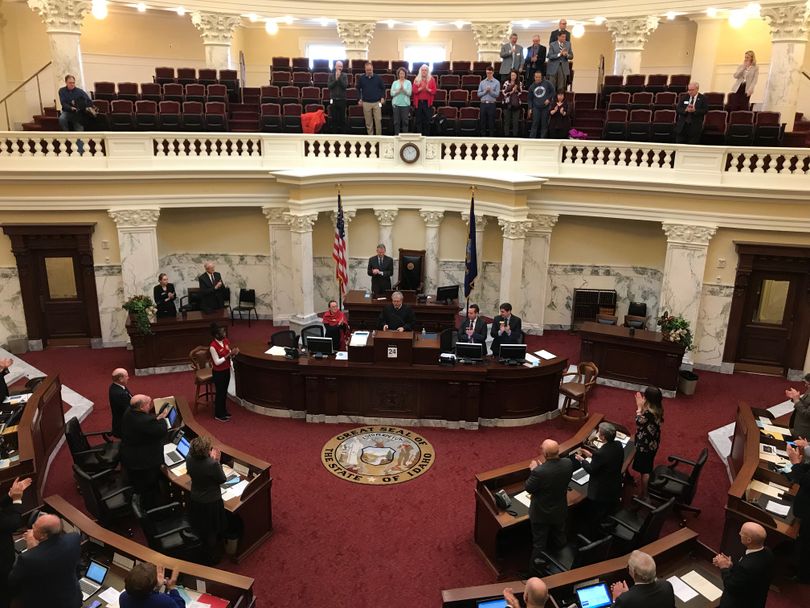Idaho facing rush of judicial vacancies, including two Idaho judges’ recent deaths

Idaho Supreme Court Chief Justice Roger Burdick’s voice broke as he announced to the House today that two Idaho judges have recently died – 5th District Judge Randy Stoker on Jan. 8, and 4th District Magistrate Judge William Harrigfeld on Dec. 13. They’re just the latest in an unprecedented string of judicial vacancies in the state that’s had Idaho’s courts scrambling.
“Nine district judges and eight magistrate judges retired or will retire in 2016-17 or the near future,” Burdick told the House and Senate today in his annual “State of the Judiciary” address. “Idaho’s demographic of the judiciary is remaking its face in a very short time.”
Burdick said just in 2017, the Idaho Judicial Council held nine sets of interviews for judge openings. “This is a record in all the annals of Judicial Council history,” he said.
In addition, Burdick told lawmakers, “The court looks with trepidation to the future concerning the impact of the fiscal changes in the federal government as well as continued financial pressures on our cities and counties. These pressures will be exacerbated by Idaho’s extraordinary growth in the last few years. We welcome our new citizens, but we must realize there will be impacts on our cities, counties, state agencies and the judiciary which must be faced.”
Even the state’s courthouses themselves, Burdick said, are “barely, if at all, meeting the needs of the counties, the judiciary, and other entities which share them.”
“Access to justice, in its most basic, form, means physical access to our courts,” he said. “In some courthouses, in the absence of even a simple elevator, witnesses with physical challenges must be carried up stairs by bailiffs or judges, just to be able to testify. In addition, high population increases certainly mean new needs for judges, but we don’t even have room to house them.”
Burdick said the court, with support from lawmakers, already has brought in national experts to examine disability access issues in Idaho courthouses and provide training for county leaders. The courts will request additional funding for that in the coming year, he said, and are working on long-term plans for “how we can tackle the looming courthouse issues.”
“We will keep this body informed of our progress on these issues in the future,” Burdick said.
Burdick also highlighted the increasing need in Idaho for guardianships and conservatorships, as the state’s population ages; and the ongoing implementation of the court’s online case management system, now entering its 5th year. He said county court clerks have helped the state “manage a fundamental change to how the courts do business.”
Initially, the new system is providing online electronic case filing and court management. Eventually, it should give Idaho citizens access to state court documents online, similar to the access already available in the federal court system.
Burdick thanked lawmakers for their continued support of the project. “The state of the judiciary is in large part a function of the cooperation of the legislative and executive branches,” he said, “as well as our county partners. Although an independent co-equal branch of government, we rise or fall based upon cooperation. We hope that cooperation continues so I can report a robust judiciary in 2019.”
